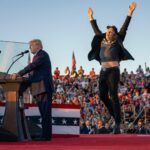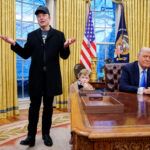The nuclear ban treaty: A missed US opportunity that can be redeemed in September
By Lawrence J. Korb | July 10, 2017
By not just refusing to endorse the new UN treaty on the prohibition of nuclear weapons but also to even participate in the negotiations that led up to its adoption, the Trump administration has undermined the United States’ moral standing in the world and jeopardized its national security by doing nothing to diminish the prospects of a nuclear war.
This treaty, which delegates to the UN approved last week by a vote of 122 to 1, delegitimizes nuclear weapons, providing for a total ban on developing, stockpiling, or threatening to use nuclear weapons. It will enter into force 90 days after it has been ratified by 50 countries; the signing period starts on September 20. In many ways, this treaty is a logical follow-on to existing treaties that have limited or banned other weapons of mass or indiscriminate destruction, among them the Nuclear Non-Proliferation Treaty (NPT) and the treaties banning biological and chemical weapons, landmines, and cluster bombs, all of which have been adopted by the international community over the past 40 years.
The Trump administration’s UN ambassador, Nikki Haley, claimed back in March of this year, when the nuclear ban treaty talks began, that the process was unrealistic and would not reduce the current global stockpile of about 15,000 nuclear weapons. As Haley put it, “We have to be realistic, is there anyone who thinks that North Korea would ban nuclear weapons?” Fortunately, more than 3,700 scientists, including 30 Nobel Laureates and a former Secretary of Defense, ignored her and signed an open letter supporting the negotiations.
It is also fortunate that the United States did not take this position when the UN in 1968 enacted the NPT, which prohibited the signatories who did not possess nuclear weapons from acquiring them and called on the nuclear powers to begin removing their stockpiles. This treaty has become the legal basis for the United States and the world community to place sanctions on Iran and North Korea for developing nuclear weapons; after all, both nations had ratified the treaty. And the UN has continued to place sanctions on North Korea, even though that nation withdrew from the treaty after President Bush placed it on the axis of evil.
It is also fortunate that people like Haley did not accompany President Reagan to Reykjavik, where he offered to get rid of all US nuclear weapons, if the Soviets did the same. The deal fell through because Soviet leader Mikhail Gorbachev conditioned his acceptance on the United States cancelling the Strategic Defense Initiative, a missile defense system that Reagan refused to give up. Nonetheless, this proposal gave the United States the moral high ground and led to several agreements with Russia, each of which significantly reduced the nuclear arsenals of both sides.
It’s also a good thing that Haley was not part of the negotiations establishing the chemicals weapons treaty; she might have undermined that treaty by arguing that the negotiations were misguided, because no one believed that countries like Syria or Iraq would really give up their chemical weapons.
American nonparticipation in this new global treaty reinforces the image of the United States as a global outlier; it has not yet ratified the Comprehensive Test Ban Treaty (CTBT) or the treaty banning landmines, not to mention the Law of the Sea convention.
Moreover, while the treaties banning biological and chemical weapons have not been completely adhered to, these treaties provide the legal basis for taking action against nations that violate them. Just recently, the Trump administration launched 59 cruise missiles against Syria, because the Assad regime used chemical weapons against those fighting to overthrow the regime. The attack that Trump ordered was applauded at home and abroad—precisely because it was seen as an effort to enforce the longstanding ban on and norm against the use of chemical weapons.
The nuclear weapons ban treaty will not, in the short term, eliminate the existing nuclear weapons currently held by nine countries. As former Defense Secretary William Perry has pointed out, however, the treaty is an important step toward delegitimizing nuclear war as an acceptable risk of modern civilization, and it creates a strong moral imperative: Thou shalt not possess nuclear weapons.
The Trump administration should not only vote in September to approve the treaty but also try to convince the world’s other eight nuclear powers, many of whom are our allies, to do the same. Obviously this treaty will not rid the world of nuclear weapons in the immediate future. However, its adoption will help lay the groundwork for their eventual abolishment, and if the world’s other nuclear powers give up their weapons, it will be safe for the United States to do the same. Moreover, the administration should work with the Senate to get it to ratify the CTBT and landmine treaties and continue to work with the international community to enforce the existing treaties banning these illegal weapons. Finally, the administration should resume negotiations with Russia to extend New START, which expires in 2021.
Together, we make the world safer.
The Bulletin elevates expert voices above the noise. But as an independent nonprofit organization, our operations depend on the support of readers like you. Help us continue to deliver quality journalism that holds leaders accountable. Your support of our work at any level is important. In return, we promise our coverage will be understandable, influential, vigilant, solution-oriented, and fair-minded. Together we can make a difference.
Keywords: TPNW, Treaty on the Prohibition of Nuclear Weapons, nuclear ban treaty
Topics: Analysis















